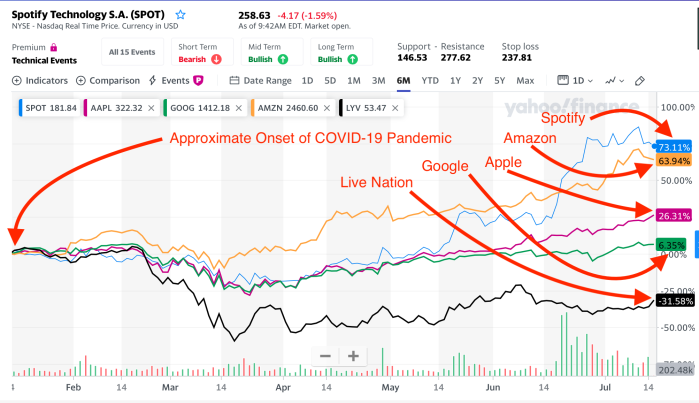It could be called the revenge of the middleman. In one of the greatest wealth transfers of all time, the value of recorded music has been largely transferred to the new middlemen at companies like Spotify, YouTube, Apple and Amazon. Record companies with large market shares are doing well with streaming, but those returns are also below where the market should be.
The running dogs of Big Tech have for years told artists that what the solution to their problem with DMCA whack-a-mole was to get out on the road and sell those t-shirts. The artists didn’t have much choice–we saw Levon Helm essentially die on the bandstand because he couldn’t stop touring.
The forced choice made by artists under DMCA duress allowed the “value gap” to spread into what could be called the “COVID Gap.” The sudden constriction of touring income to zero or near zero acts like a reality superspreader—the streaming deal is both grotesquely unfair and supremely enlightening.
We know why it’s unfair: Fans pay for music they don’t listen to. But its enlightening because the tale of the tape demonstrates that recorded music does have tremendous value and that value is being captured by the middlemen, especially Spotify and more particularly Spotify’s President for Life Daniel Ek’s personal fortune. There’s no rational reason why Spotify should have a market cap that is 300% of the Warner Music market cap.

Canadian polling company Abacus has completed a study that everyone in live music should read very carefully. The poll tells us a lot about artist attitudes toward the recovery of live music and it is the only one of its kind that I know of. Why we don’t have something similar in the U.S. or in the U.K. is a mystery, but I doubt that it would tell you anything different.
It highlights the main factor that seems to get overlooked a lot—great that people want to open up venues, great that there is some bit of money being thrown at venues (although nowhere near enough), but even if the venues manage to survive and even if they manage to attract fans to come back, who exactly do people think they are going to get to perform?
Artists are presented with a patchwork quilt of rules and regulations that show a rather hair raising maze to drive through (because nobody’s going to be flying). Artists have families just like anyone else, so before you even get to the economics, you have to protect the children.
I strongly recommend that everyone read carefully the Crowded Out study and think hard about what it means. As an Austinite, I can tell you that I fully expect that Big Tech will be granted its fondest wish–Austin will become just another college town with a Google campus and they can finally jettison this “Live Music Capitol of the World” moniker.
If you don’t want that to happen to New Orleans, Nashville, Memphis and Atlanta, or a host of other cities, then you need to have some answers to the Crowded Out research.
You also need to have the fortitude to renegotiate those streaming deals to eliminate both the Value Gap and the COVID Gap.